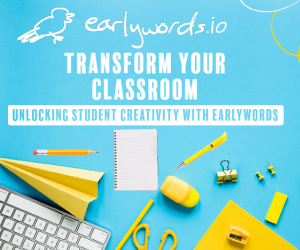Unlocking Student Creativity with EarlyWords: A Guide for Teachers
Our platform is designed to help students, from grade school to college, develop the habit of daily stream-of-consciousness journaling. With EarlyWords, we make it easier and more efficient to engage in this practice. We offer the platform for free with our pricing for justice model.
By spending just a few minutes each morning journaling with EarlyWords, students can clear their minds and organize their thoughts. This can help them start their day with a sense of focus and purpose, making them better equipped to handle the challenges of school and life. These exercises can be a great way to improve students’ writing skills, as well as their ability to think creatively and critically.
EarlyWords can be used for short writing exercises that don’t require grading or revisiting. Students can save their writing if desired. However the entire site is encrypted to protect all writer’s privacy.
Once students have completed 750 words, they can post their writing to our community forum. This is a great way to receive and provide encouragement with peers. It’s also a tool for teachers to track progress. Our community forum is a supportive space where students can connect with others who are also practicing daily journaling and writing.

Revolutionize Your Writing Curriculum with EarlyWords: Tips and Templates for Teachers
Here are a few template uses for EarlyWords that teachers can incorporate into their lesson plans:
- Daily journaling: Encourage students to use EarlyWords for daily morning pages. This can be done as a warm-up exercise at the start of each class or as homework.
- Creative writing prompts: Provide students with writing prompts to inspire their creativity. These prompts can be used for short writing exercises that can be done in class or as homework.
- Reading response journal: After students finish reading a book or an article, have them use EarlyWords to write a response journal entry. This can help students reflect on what they’ve learned and make connections to their own lives.
- Vocabulary building: Have students use EarlyWords to write short paragraphs that incorporate new vocabulary words. This can be a fun and engaging way to reinforce vocabulary lessons.
- Reflective writing: Use EarlyWords for reflective writing assignments that encourage students to think deeply about their learning experiences. This can be particularly useful for students who are struggling with a particular topic or concept.
- Brainstorming: Use EarlyWords to facilitate brainstorming sessions for class projects or assignments. Students can use the platform to generate and organize their ideas before presenting them to the class.
- Research journal: Have students use EarlyWords to keep a research journal as they work on a long-term research project. This can help them stay organized and track their progress as they gather information and write their paper.
We hope that EarlyWords can be a valuable tool for teachers and students alike. By incorporating daily journaling into their routine, students can develop important skills that will serve them well in school and beyond.

